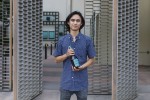Ruoxuan Li flipped through Francis Ford Coppola’s photo album and found the image she was looking for. Behind the protective sleeve was an aging photo of young twin boys from the 1920s.
The School of Theater, Film and Television alumna stared at the picture and retreated into a warehouse full of clothing. Li returned to the film set with matching white bows similar to those in the photograph and approached Coppola for his opinion on their style.
“I wanted to make (the costumes) as real as possible,” said Li, a recent graduate of the master of fine arts costume design program. “We were recreating the looks based on (Coppola’s) family using his family photo albums. It was a challenge, but it was fun.”
Students and faculty worked alongside five-time Academy Award-winning filmmaker and alumnus Coppola on an experimental new genre of multimedia. Li and 75 other UCLA students participated in a five-week workshop produced by Coppola’s film studio, American Zoetrope. The project culminated in “Live Cinema,” a live merging of film, television and theater technologies on July 22.
Jeff Burke, assistant dean of technology and innovation at the School of Theater, Film and Television, coordinated the project.
Coppola was involved throughout the formation of the workshop, including initial development, meetings, production and student participation, Burke said.
“Francis really wanted different student perspectives on traditional ideas,” Burke said.
Coppola discussed the idea of “Live Cinema” with Theater, Film and Television undergraduate and graduate students and staff. Coppola shared excerpts of his script “Distant Vision.” The workshop focused on scenes with a multigenerational Italian-American family in 1920s Harlem, Li said.
The aim of the “Live Cinema” project was to reimagine the making and viewing of cinema, Burke said. The experimental process involved the preparation and energy of theater integrated with the technological coordination of moviemaking and live, televised streaming, Burke said. The final product was a film viewed by audiences in real time.
“It seemed like a great opportunity after hearing (Coppola) speak about the future of film,” said Lesley Elizondo, a cinematography graduate student who worked as best boy electric on the “Live Cinema” set. “The opportunity to work with such a great director on such an innovative project was something I had to take advantage of.”
Students began the workshop on June 20 and were divided into multiple groups on set, including costume design, production, camera operation, grip and electrics, and stage managing.
Meedo Taha, a film production and directing graduate student, joined the workshop as a member of the camera department.
“The talk that Mr. Coppola gave was the main reason I joined,” Taha said. “He’s a filmmaker who has done it all but is still looking to push the boundaries of film. It was very inspiring.”
The hands-on workshop encouraged the creative and technical capacity of all the student crew members, Taha said. Each day on set incorporated varying degrees of instruction, familiarizing the teams with technical aspects and department coordination to procure a sense of unity among the theater and film, television, and digital media departments, he said.
Mark Daniel Quintos, a film alumnus and camera technical director for “Live Cinema,” said he was interested in how Coppola and director of photography Mihai Mălaimare Jr. would create the live moviemaking experience in the “Distant Vision” project.
“Francis was quick to state that he did not know what it was that we were doing here exactly, but that he wanted to learn just like the rest of us,” Quintos said.
Amani Alsaied, a film production and directing graduate student, worked as a stage manager. Alsaied scheduled rehearsals, managed the actors and props necessary for a scene and prepared Coppola’s daily notes for each department.
Li said she gained confidence by interacting casually with the accomplished director on the original project.
“We could really talk to him,” Li said. “He totally encouraged me and followed my suggestions. The whole experience taught me about the real industry.”
Taha, an aspiring director, said the experience influenced his directing style and set etiquette through the workshop’s inclusive atmosphere.
“(Coppola) was aware he was working with not just students but future creatives,” Taha said. “A director should make everyone feel essential. For the project, I felt like I needed to be there, not just because I wanted to, but because I was valuable to the team.”
Students watched the final production of “Distant Vision” in the James Bridges Theater after the set wrapped.
While the students performed only an excerpt of Coppola’s original script, many are excited about their participation in the future of “Live Cinema” as filmmakers, Quintos said.
“I don’t know if I’ve really wrapped my head around it still,” Quintos said. “It’s just that surreal … to be a part of (Coppola’s) cinematic story and the story of cinema in general.”
